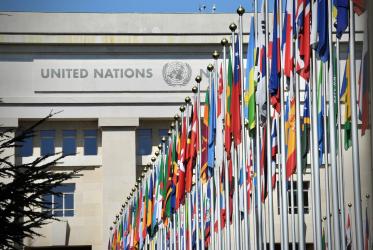Free photo available, see below.
Bishop Dr Wolfgang Huber, chair of the Council of the Evangelical Church in Germany (EKD), has expressed his appreciation of World Council of Churches (WCC) work. During a 22-24 September visit to Geneva, Huber said that he follows WCC activities "with great sympathy", and assured WCC general secretary Rev. Dr Sam Kobia of the "support and solidarity" of the EKD. Kobia visited Germany in July, and Huber was returning his visit.
Referring to Orthodox participation in the WCC, "I am happy to hear that the Orthodox members of the WCC are accepting the recommendations of the Special Commission", Huber commented, adding that "We will try to live with those recommendations even in the areas where we have some difficulties." Regarding the impact of the changes on the WCC's life and work, Huber expressed his hope that membership in the Council, and its worship and spiritual life in particular, would "remain relevant".
On the Council's financial situation, Huber noted that it "has been able to address financial difficulties with new structures, and has reached some stability," which would help it to "focus on its important programmatic issues". Thus "the WCC is now in a better position to negotiate from a solid financial basis with funding partners and specialized ministries".
As Rev. Dr Samuel Kobia pointed out, "further cooperation between WCC and EKD is very important, particularly in light of the worldwide responsibility of the ecumenical fellowship for justice and peace". Both leaders said they hoped that the relationship between WCC and EKD as well as their personal contact would continue to deepen.
According to Huber, the reconfiguration of the ecumenical movement, another crucial issue, should "lead to stronger cooperation among ecumenical bodies". The possibility that the Lutheran World Federation and the World Alliance of Reformed Churches might hold their next general assemblies together would be a good example of such cooperation, he said.
Emphasizing the role churches play in the field of human rights and refugees, Huber suggested that their approach to these issues is "to certain extent different from those of other non-governmental organizations". Christians all over the world "pray every Sunday for those whose human rights are violated, and express their solidarity through their intercessions". Churches are very close to the "grassroots", and should take advantage of their favoured situation to "deepen and improve" their commitment, he said.
As a member of the WCC Executive Committee, and having visited the WCC for the first time in 1969, "More than half of my life has been related to the WCC," Huber said, adding that the relationship had been "very formative for my personal life and my ecumenical journey".
During his visit to Geneva, Huber, who is bishop of the Evangelical Church Berlin-Brandenburg-schlesische Oberlausitz, met with the WCC general secretary Rev Dr. Samuel Kobia and WCC programme staff as well as with the general secretaries of the Conference of European Churches, the Lutheran World Federation and the World Alliance of Reformed Churches. He also met with the deputy director of the United Nations High Commissioner for Refugees (UNHCR) Europe office, as well as with the German ambassador at the United Nations.
A free high resolution photo is available at






